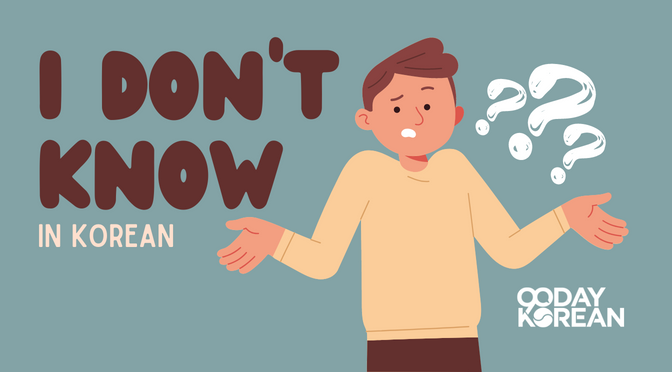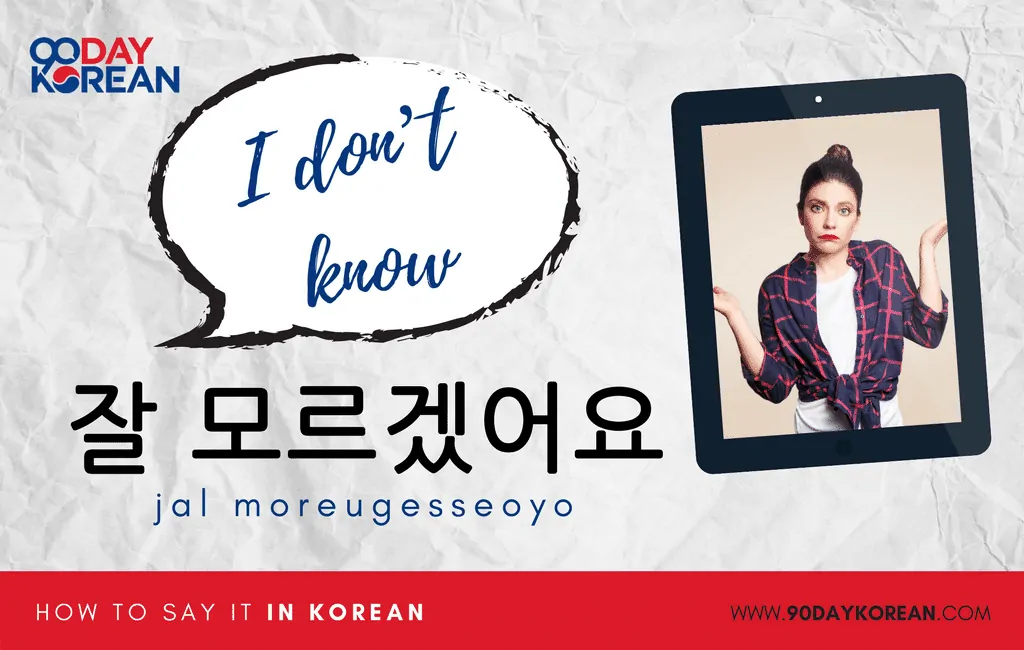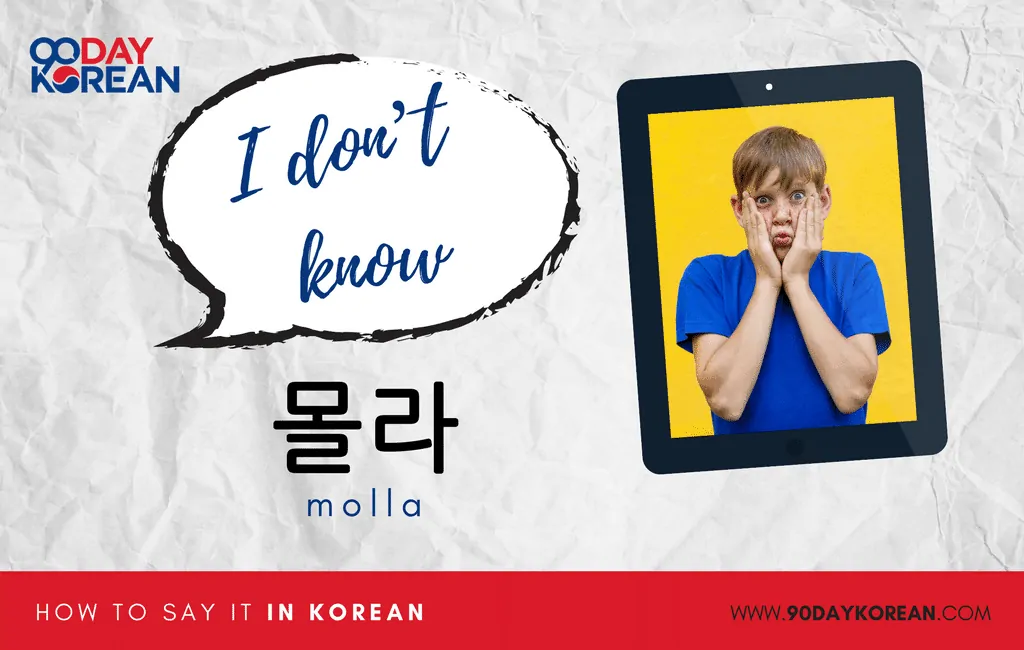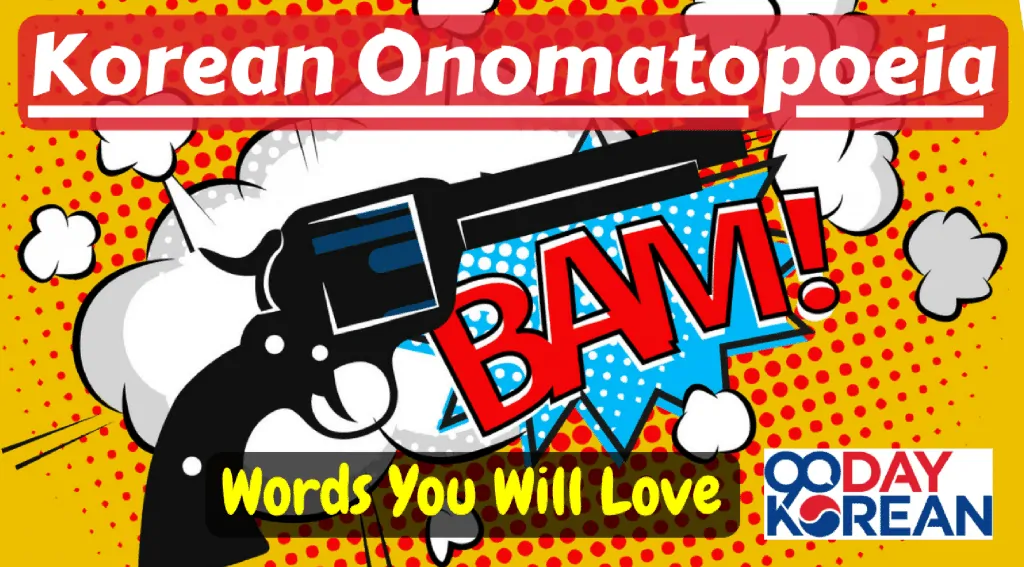Today, we will explain how to say “I don’t know” in Korean.
We all like to know the answers to questions. It makes us feel helpful, knowledgeable, and in control.
However, there will always be times when we don’t know the answer to something. In those cases, it’s best to tell the truth and say, “I don’t know.” The other person will respect your honesty!
We’ve also included a FREE PDF guide to this lesson that you can take with you on the go. Check it out below:
On your marks, get set, go!
Contents
What is the Root Verb for “I Don’t Know?”
Before we head on to the different ways to say “I don’t know” in Korean, let’s first learn about the verbs that we’ll be using. There are two verbs that we’re going to compare today. They are opposites: One is quite knowledgeable, and one is ignorant.
The first verb is our knowledgeable friend 알다 (alda), which means “to know.” The second verb is our bumbling buddy, 모르다 (moreuda), which means “To not know.”
모르다 (moreuda)
Although we always like to look on the bright side, we’re mainly focusing on 모르다 (moreuda). However, it’s always good to know about the existence of 모르다 (moreuda)’s smarty-pants counterpart!
Let’s get better acquainted with 모르다 (moreuda).
모르다 (moreuda) is an irregular verb of the 르 (reu) variety.
Other verbs and adjectives that follow this pattern include 빠르다 (ppareuda | to be fast), 다르다 (dareuda | to be different), 부르다 (bureuda | to call), and 마르다 (mareuda | to be dry) among others. When conjugating such a verb, an extra ㄹ appears in the word, and the “ㅡ” changes to either “ㅏ” or “ㅓ” depending on the vowel in front of it.
How to say “I don’t know” in Korean
Now we know the verbs that we need to use; we can look at how these verbs are conjugated depending on the level of formality that we are using. Here’s a quick video about how to say “I don’t know” in Korean.
Formal “I Don’t Know” in Korean
We will start with the most formal version. Here’s how to say “I don’t know” in Korean when you speak with strangers and people older than you.
1. 잘 모르겠습니다 (jal moreugetseumnida)
This expression uses the formal ending -ㅂ니다 (-ㅂ nida). This is usually used when speaking to an unknown audience or if you are required to be very formal.
2. 잘 모릅니다 (jal moreumnida)
Similar to 잘 모르겠습니다 (jal moreugetseumnida), 잘 모릅니다 (jal moreumnida) also uses the -ㅂ니다 (-ㅂ nida) ending which signifies that it is used when speaking formally.
The two above expressions are interchangeable. The 겠 (get) part of the first expression appears in many phrases. It shows that the speaker intends to do something or is making some assumptions. It also appears in some fixed expressions, especially the verbs “to know” and “to not know.”
잘 (jal) means “well,” so effectively, you are saying, “I don’t know well.”
Standard “I Don’t Know” in Korean
There are three different ways to say “I don’t know” in Korean in its standard form.
1. 몰라요 (mollayo)
The first standard way to say “I don’t know in Korean” is 몰라요 (mollayo). Here’s an example sentence:
Example:
A: 김 선생님 알아요? (gim seonsaengnim arayo)
Do you know Mr. Kim?
B: 몰라요. (mollayo)
No, I don’t.
You don’t have to say “no” in your answer. It is already implied by the verb “I don’t know.”
2. 잘 몰라요 (jal mollayo)
3. 잘 모르겠어요 (jal moreugesseoyo)
You can interchangeably use the three regular ways of saying “I don’t know” in Korean. However, the 잘 (jal) sounds a little bit more polite.
Usually, this verb is used to answer questions that include either 알다 (alda) or 모르다 (moreuda) in them.
Informal “I Don’t Know” in Korean
Lastly, below are the two ways to say “I don’t know” in Korean informally.
When speaking with close friends, you’ll often use informal Korean. It’s more comfortable and simpler and helps you develop a more intimate relationship with the other speaker.
1. 몰라 (molla)
When saying the informal version of “I don’t know,” this is the same as the standard Korean form but without the 요 (yo).
2. 모르겠어 (moreugesseo)
Lastly, another informal way to say this phrase is 모르겠어 (moreugesseo). This is quite similar to the standard version 잘 모르겠어요 (jal moreugesseoyo), just without 잘 (jal) and the ending 요 (yo).
Wrap Up
Hopefully, this lesson has given you a better understanding of saying “I don’t know” in Korean. If you don’t know the answers to Korean questions like why, when, how, who, where, which, or what, then you can simply say 몰라요 (mollayo).
Soon, you’ll be turning 몰라요 (mollayo) into 알아요 (arayo)!
We’ve got more great Korean Phrases for you to learn. So what are you waiting for?









Is it okay to say “mollayo hangul” for “i don’t know korean”
Hi, Daniel! It would be better to say “한국말 몰라요” [Hangungmal mollayo] to say “I don’t know Korean”. ^^
Is this another way of saying it? 나는 모른다
That’s correct, Jaya! ^^
This helped me so much, I always thought the only meaning for ‘I don’t know’ is moreugesso. Thanks a bunch.
Thanks for the comment, Maya! ^^
This was so helpful! I recently watched a video in Korean and I thought that it was spelt with ㅂ instead ㅁ. It makes so much more sense!
Hi, Holly! Yes, ㅁ is correct. ^^
어떤 문장을 더 자연스러워요?
– 이 노래를 몰랐어요.
– 이 노래를 알지 못했어요.
Hi Sabrina! 어떤 문장”이” 더 자연스러운지 알려줄게요 (Let me tell you which sentence sounds more natural!)
They’re both good sentences, but 이 노래를 몰랐어요 might be more often used in daily life. ^^